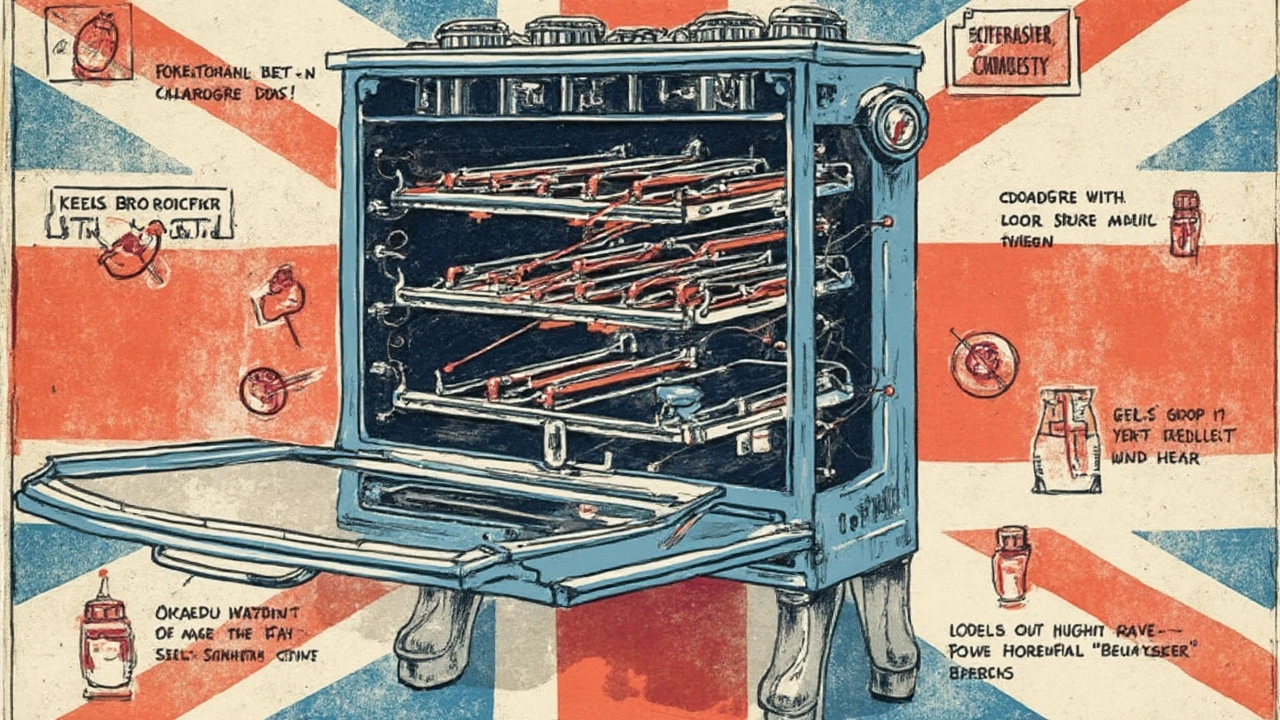When it comes to the lifespan of a cooker, the average range sits comfortably between 10 to 15 years. Now, this might sound like a wide gap, but here's the thing: a lot depends on how you use and maintain it. From light stir-fries to all-day stews, how often you press those buttons does play a role in the wear and tear of your beloved kitchen helper.
Let’s face it, no one wants a cooker that gives up the ghost in just a few years. But worry not! With a bit of regular TLC, you can push the lifespan of your cooker closer to its maximum potential. Routine cleaning, timely repairs, and smart cooking practices all add up when it comes to longevity.
Think about it like this: a properly maintained cooker is a bit like a well-oiled machine. Ignoring small problems can lead to bigger ones down the road. So, it’s worth knowing a few signs that may indicate your cooker’s approaching its twilight years, like inconsistent heating or strange smells. Catching these early can save you a headache and a half!
- Typical Cooker Lifespan
- Factors Affecting Cooker Longevity
- Signs of a Cooker Nearing Its End
- Maintenance Tips
- When to Repair or Replace
Typical Cooker Lifespan
So, how long does a cooker really last? Well, on average, you can expect a decent cooker lifespan to range from 10 to 15 years. But, of course, this isn’t set in stone. Several factors like usage, maintenance, and sometimes sheer luck can shift those numbers around a bit.
For instance, a cooker that's given a lot of love with regular cleaning and maintenance checks might comfortably tick along beyond the 15-year mark. On the flip side, one that's neglected might start throwing in the towel a bit earlier.
Gas vs. Electric Cookers
Interestingly, the type of cooker you have plays a role too. Gas cookers generally clock in with a longer shelf life compared to electrics. That’s mainly because they have fewer electrical components that can fail. Regular checks on the gas connections and cleaning of burners can easily push their lifespan.
Meanwhile, electric cookers might need a tad more vigilance in terms of maintenance. With elements that can wear out or electric circuit issues popping up, they might require a few more repairs during their lifetime.
Brand and Model
The brand and model of your cooker come into play too. Some brands stand the test of time better than others due to superior build quality. If you’re thinking long-term, investing in a reputable brand might save money in repairs and replacements.
| Cooker Type | Average Lifespan |
|---|---|
| Gas | 10-18 years |
| Electric | 8-15 years |
With that said, staying mindful of your cooker's performance over time and acting swiftly on any new issues will ensure it sticks around as long as possible.
Factors Affecting Cooker Longevity
Ever wondered why some cookers seem to last forever while others conk out after just a few years? It turns out, several factors are at play here. Let's break it down so you can get the most mileage out of your kitchen appliances.
Usage Frequency
First things first, how often you use your cooker matters a ton. A cooker used daily for big family meals will naturally wear out faster than one that’s only fired up on weekends. A good rule of thumb? The more you use it, the more care it needs.
Quality of the Cooker
Not all brands are created equal. Generally, investing in a reputable brand might cost you more upfront, but it often pays off through better longevity. High-quality cookers are built to withstand the rigors of regular use and tend to have parts that are easier to replace or repair.
Regular Maintenance
Skipping regular cleaning might save you time today but could reduce your cooker’s lifespan. Grease, food particles, and grime can clog up burners and other components, causing strain and wear. A simple wipe-down after cooking can do wonders.
- Clean burners regularly to prevent blockages.
- Check the seals on oven doors to ensure they're intact.
- Keep an eye out for any strange noises or smells. These can be warning signals.
Environmental Factors
Believe it or not, where your cooker is located can also affect its lifespan. A cooker placed in a well-ventilated kitchen tends to have a longer life. Humidity, extreme temperatures, or inadequate ventilation can escalate wear and tear.
Installation and Setup
How your cooker is installed also matters. An improperly installed cooker can lead to uneven heating and unnecessary stress on the appliance. Ensure proper setup, which might involve hiring a professional if you're not sure.
Realizing these factors affecting cooker longevity can help you adjust how you care for your cooker. Keeping these points in mind will help extend the life of your trusty kitchen companion, saving you from having to call for cooker repair services too soon.

Signs of a Cooker Nearing Its End
Knowing when your cooker is on its last legs can be a game-changer. A few telltale signs can save you from an unexpected kitchen disaster.
Uneven Cooking
If your dishes are coming out half-baked or overcooked on one side, it might be more than just your recipe at fault. Uneven cooking is often a sign that the heating elements in your cooker are wearing out. Check for hot spots or areas that don’t heat up as they should.
Strange Noises
Is your cooker making odd sounds it didn't make before? Clicking, rattling, or buzzing noises are not part of the cooking symphony. These sounds can indicate loose parts or failing components that might need a closer look.
The Smell Test
Odd smells are another red flag. If your kitchen appliance gives off burnt or gas-like odors, there might be an issue with the wiring or gas connections. Always ensure your cooker is off and consult a professional right away to prevent hazards.
Control Malfunctions
Are your buttons or knobs less responsive? Problems with electronics or controls can indicate more significant internal issues. If you find yourself wrestling with controls more than actually cooking, it might be time for a technician or a new appliance.
Frequent Repairs
If you’re constantly calling in repairs or re-fixing the same problems over and over, it could mean your cooker is beyond salvageable. While repairs can extend the lifespan, at some point, the costs won’t justify the temporary fixes.
In a 2024 survey, 65% of households said they preferred replacing their kitchen appliances when repair costs hit half the price of a new one. Sometimes, letting go sooner is more cost-effective in the long run. Keep an eye out for these symptoms, and you’ll know just when to start saving for that upgrade.
Maintenance Tips
Keeping your cooker in top shape isn’t rocket science, but a little attention can go a long way. Regular maintenance can push its lifespan into that healthy 15-year territory. Here’s how to make sure your cooker sticks around and works like a charm.
Routine Cleaning
First things first: cleanliness is key. Spillovers and grease can build up over time, reducing your cooker's efficiency and even causing damage. After every meal prep, give the grates and burners a quick wipe-down. For a deeper clean, mix some vinegar and baking soda together to tackle stuck-on gunk.
Check and Replace Seals
Seals are crucial for ovens within your cooker. A damaged seal can lead to heat loss, which means longer cooking times and more energy use. Inspect these regularly and replace them when you notice cracks or wear.
Inspect Burners and Heating Elements
Whether you’re using a gas or electric cooker, the burners or elements are your main squeeze. Look out for inconsistent flames or elements failing to heat evenly. Basic maintenance includes keeping them clean and checking connections.
Mind the Filter and Vent
For those with a cooker hood, filters and vents can have sneaky buildups that impede performance. Ensure they're cleaned out regularly. A solid rule of thumb is to check them every couple of months.
“The life of an appliance largely depends on its use and care. Pay attention to regular maintenance to extend its service life significantly,” advises Mark Thompson, a well-known authority in appliance maintenance.
Give It a Check-Up
Even with the best care, sometimes calling in a professional is the best course of action. Annual inspections by technicians can catch small issues before they snowball.
With these easy-peasy steps, your cooker lifespan can reach its full potential, saving you money and unnecessary stress down the line!
Here’s a basic checklist to keep handy:
- Wipe down after every use
- Deep clean once a month
- Inspect burners and seals regularly
- Check filter and vent bi-monthly
- Professional inspection annually

When to Repair or Replace
Deciding whether to repair or replace your cooker can feel a bit like being stuck between a rock and a hard place. But making an informed choice could save you a bundle in the long run. The first step in the process is to assess the extent of the damage. For minor issues like a broken knob or a faulty burner, a repair might be a quick and cost-effective solution.
Signs It's Time to Repair
If your cooker starts showing signs of age, like inconsistent temperatures or noisy operation, it could still be salvageable. Here are a few telltale signs that a repair is all you might need:
- Uneven cooking or temperature issues that persist.
- Strange noises coming from the appliance.
- A cracked door seal or gasket that needs replacing.
Tackling these problems sooner rather than later can prevent them from snowballing into bigger, more costly issues.
When Replacement Makes More Sense
Sometimes, cutting your losses and investing in a new cooker is the wiser choice, especially if:
- The cost of repair is more than half the price of a new appliance.
- Your appliance is nearing the end of its average lifespan of 10 to 15 years.
- There's visible damage like rust, which indicates potential internal issues.
- The cooker consistently fails to function efficiently despite repairs.
While a brand-new cooker might seem like a big expense upfront, it can actually save money over time with better energy efficiency and fewer repairs.
Cost-Effective Decision Making
Here’s a quick way to break it down:
| Scenario | Action |
|---|---|
| Minor issues, under warranty | Repair |
| Major issues, over 10 years old | Replace |
| Repair cost < 50% of new price | Repair |
| Repair cost > 50% of new price | Replace |
An important thing to remember is to keep track of how your cooker performs over time. Jot down any services it needs, and don’t shy away from seeking professional advice when you're unsure. In the end, a proactive approach can help make the best decision for your peace of mind and wallet.




